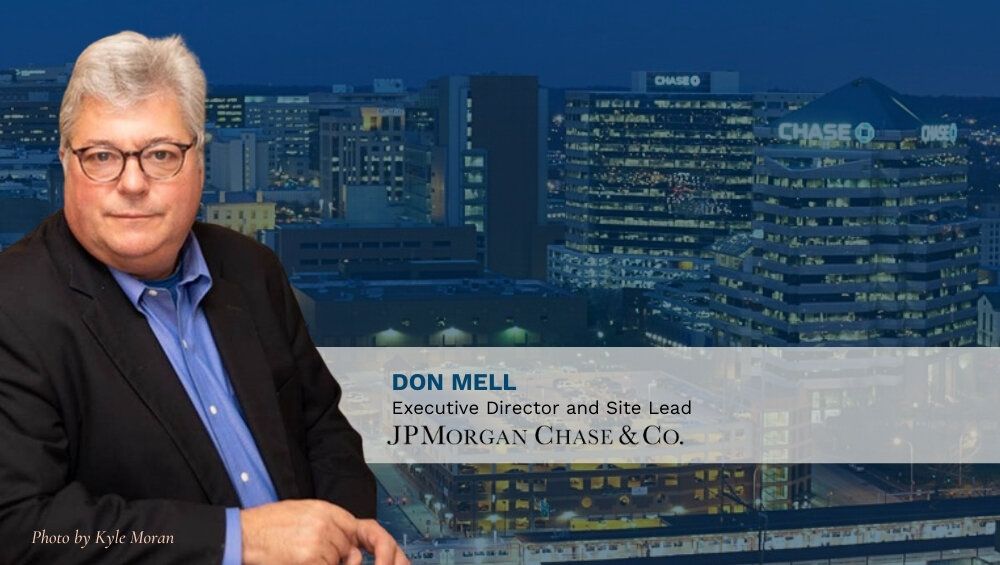The Pandemic Isn’t Slowing Down JPMorgan Chase’s Remarkable Momentum

March 12, 2021 –
The COVID-19 pandemic has led to a lexicon of words and phrases that have quickly become commonplace. Consider “flatten the curve,” “mask up” and “shelter in place.” In business, companies receive kudos for their ability to “pivot.”
In reality, pivoting is another word for adapting, and even before the pandemic, it was the characteristic of a successful company. JPMorgan Chase is a prime example. The nation’s largest bank is also among Delaware’s largest employers, with close to 11,000 employees in the state.
Early on, JPMorgan Chase realized the value of Delaware’s strong financial services sector. In 2014, the company spent $44 million to buy a 58-acre parcel in Wilmington from AstraZeneca Pharmaceuticals, including a four-story 203,602-square-foot structure and three-story 153,949-square-foot facility. In 2015, after investing $185 million in renovations, JPMorgan Chase christened its state-of-the-art Delaware Technology Center on the site, which is zoned to allow an additional 800,000 square feet of office space.
JPMorgan Chase contributes to the community as well as to Delaware’s economy. In April 2020, for instance, JPMorgan Chase’s Delaware Market Leadership team committed $100,000 in funding to target immediate and medium-term local needs related to COVID-19. In 2019, the firm announced a $4 million investment over three years with Equitable Wilmington so more residents can share in the rewards of a growing economy. The funding will support affordable housing development, small businesses and community facilities in neighborhoods surrounding Wilmington’s Central Business District.
A Converstion with Don Mell of JPMorgan Chase in Delaware
Delaware Prosperity Partnership talked to Don Mell, Executive Director and Site Lead for JPMorgan Chase in Delaware, about the company’s continued growth in the state’s exploding fintech and financial services sector.
How challenging was it to adapt to the new normal during the pandemic?
We really pulled together as a team, our leadership and our entire employee base pulled together. I also give credit to Delaware. From day one, Governor John Carney recognized the importance of financial services in the state, and he made it easy for us to do our job safely.
The mayor of Wilmington, the New Castle County executive and the governor were all on the same page. People in this area feel confident and comfortable with their leadership. All three have provided clear, consistent and transparent decision-making and leadership as events unfolded over the course of the past year.
You’ve been hiring. What’s driving the growth?
If you think about it, this year has been so trying on people’s finances. Our customers need us now more than ever.
On the retail side, we’ve been expanding with new branches so people can do their banking, so we are continuously hiring for that. We’re strong in the digital space as well. For example, we recently hired 30-plus graduates from Zip Code Wilmington, a nonprofit software-development training program. In other words, pumping the brakes is not a possibility for us.
What attracts talent to Delaware?
The proximity to D.C., Philadelphia, New York and other cities on the East Coast is obvious. People are also re-evaluating the benefits as well as the downside that a large metropolitan lifestyle presents and are seeing the advantages that smaller cities and communities offer. If you look at the cost of living, the value you get in Delaware is equal to or better than almost anywhere else on the East Coast.
Anyone who can work from home can be in a family-friendly place and save money. It’s easier to get around here than in larger metropolitan areas. It’s easier to go out, and it’s easier to interact.
When it comes to talent, what do you need?
The need for us is still at all skill levels. We need entry-level, and we need executive-level. We have every line of business in this state, and the skillset for one might be quite different from the skillset for another.
Things are progressing rapidly on the technological front because the pandemic has forced them to. We need to address technology and infrastructure as a company and as a country. Both need to be a priority not only for the state but also for our industry — and other industries.
There’s a race to make sure there’s a tech talent pipeline and also to diversify that pipeline. We need to reskill and upskill people. We need to make sure higher education is doing its part, as well as nontraditional areas of learning, so we’re nimble.
What is the future of the workplace?
We’ve learned a lot of lessons over the past year. The things we assumed six months ago are not necessarily true today. The workplace a year from now will not look like the workplace of a year ago, but it won’t look like it does now. You’re going to see office redesigns. People will always want to interact with other folks. The meaning of interaction has changed throughout this pandemic, and whether it’ll be in-person or not, and how soon, remains to be seen. But whatever the case may be, we will need collaboration to do it well.
What is JPMorgan Chase’s approach to building community?
We’re very proud that per capita, we have as much volunteer engagement in this market as anywhere else in the country. We have a highly engaged employee base. We make an impact by thinking about people that aren’t as fortunate as we are. And, we know how important it is to be strategic in our investments in community development.
We think it may be because Delaware’s size is one of its strengths; its size seems to enable a deeper and stronger sense of community in this company.
Newsletter Sign Up
Stay Up To Date With Delaware